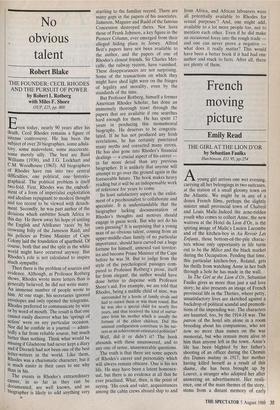No obvious talent
Robert Blake
THE FOUNDER: CECIL RHODES AND THE PURSUIT OF POWER by Robert I. Rotberg with Miles F. Shore
OUP, £25, pp. 800
yen today, nearly 90 years after his death, Cecil Rhodes remains a -figure of intense controversy. He has been the subject of over 20 biographies, some adula- tory, some malevolent, some inaccurate, some merely silly. The best are Basil Williams (1938), and J.G. Lockhart and C.M. Woodhouse (1963). All biographers of Rhodes have run into two central difficulties, one political, one historio- graphical. The political problem is itself two-fold. First, Rhodes was the embodi- ment of a form of imperialist exploitation and idealism repugnant to modern thought and too recent to be viewed with detach- ment. Secondly, he was part author of the divisions which embitter South Africa to this day. He threw away his hope of uniting the English and Afrikaner `races' by his crowning folly of the Jameson Raid; and his policies as Prime Minister of Cape Colony laid the foundation of apartheid. Of course, both that and the split in the white world might have occurred anyway. But Rhodes's role is not calculated to inspire much sympathy. Then there is the problem of sources and evidence. Although, as Professor Rotberg shows, Rhodes wrote more letters than is generally believed, he did not write many. An immense number of people wrote to him. At one stage, his secretaries ignored envelopes and only opened the telegrams. Rhodes preferred to communicate by wire or by word of mouth. The result is that one cannot easily discover what his 'springs of action' were on any particular occasion. Nor did he confide in a journal — admit- tedly a far from reliable source, but much better than nothing. Think what would be missing if Gladstone had never kept a diary and if Disraeli had not been one of the best letter-writers in the world. Like them, Rhodes was a charismatic character, but it is much easier in their cases to see why than in his.
The events in Rhodes's extraordinary career, in so far as they can be documented, are well known, and no biographer is likely to add anything very
E
startling to the familiar record. There are many gaps in the papers of his associates. Jameson, Maguire and Rudd of the famous Concession destroyed theirs. Nor have those of Frank Johnson, a key figure in the Pioneer Column, ever emerged from their alleged hiding place in Jersey. Alfred Beit's papers have not been available to the author, and the papers of one of Rhodes's closest friends, Sir Charles Met- calfe, the railway tycoon, have vanished. These disappearances are not surprising. Some of the transactions on which they might have shed light were on the fringes of legality and morality, even by the standards of the time.
But Professor Rotberg, himself a former American Rhodes Scholar, has done an immensely thorough trawl through the papers that are available if one searches hard enough for them. He has spent 17 years in producing this monumental biography. He deserves to be congratu- lated. If he has not produced any fresh revelations, he has certainly punctured many myths and corrected many errors. He has also gone into Rhodes's financial dealings — a crucial aspect of his career in far more detail than any previous biographer. It is unlikely that anyone will attempt to go over the ground again in the foreseeable future. The book makes heavy reading but it will be an indispensable work of reference for years to come. Its least satisfactory aspect is the enlist- ment of a psychoanalyst to collaborate and speculate. It is understandable that the biographer lacking documentation of Rhodes's thoughts and motives should engage in guess work. But why not do his own guessing? It is surprising that a young man of no obvious talent, coming from an upper-middle-class family of no particular importance, should have carved out a huge fortune for himself, annexed vast territor- ies and become Prime Minister of the Cape before he was 38. But to judge from the style of the psychological passages com- pared to Professor Rotberg's prose, itself far from elegant, the author would have done better to dispense with Professor Shore's aid. For example, we are told that Rhodes, being a middle child of nine, was
surrounded by a horde of family rivals and had to outwit them or win them round. But he was also a special child for nearly five years, and thus received the kind of nurtur.. ance from his mother which is usually the fortune of the eldest children. Did this unusual configuration contribute to his suc- cess as an achievement-orientated politician?
Well, did it or didn't it? The book abounds with these unanswered, and to any one of sense, unanswerable questions.
The truth is that there are some aspects of Rhodes's career and personality which will always remain obscure. One is his sex life. He may have been a latent homosex- ual, but there is no evidence at all that he ever practised. What, then, is the point of saying, 'His cook and valet, acquaintances among the cabin crews aboard ship to and
from Africa, and African labourers were all potentially available to Rhodes for sexual purposes'? And, one might add, available to a lot more people too, not to mention each other. Even if he did make an occasional foray into the rough trade and one can never prove a negative what does it really matter? This would have been a better book if it had had one author and stuck to facts. After all, there are plenty of them.


















































 Previous page
Previous page